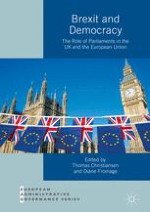2019 | OriginalPaper | Buchkapitel
9. The Spanish Parliament and Brexit
verfasst von : Antonio Bar Cendón
Erschienen in: Brexit and Democracy
Verlag: Springer International Publishing
Aktivieren Sie unsere intelligente Suche, um passende Fachinhalte oder Patente zu finden.
Wählen Sie Textabschnitte aus um mit Künstlicher Intelligenz passenden Patente zu finden. powered by
Markieren Sie Textabschnitte, um KI-gestützt weitere passende Inhalte zu finden. powered by
